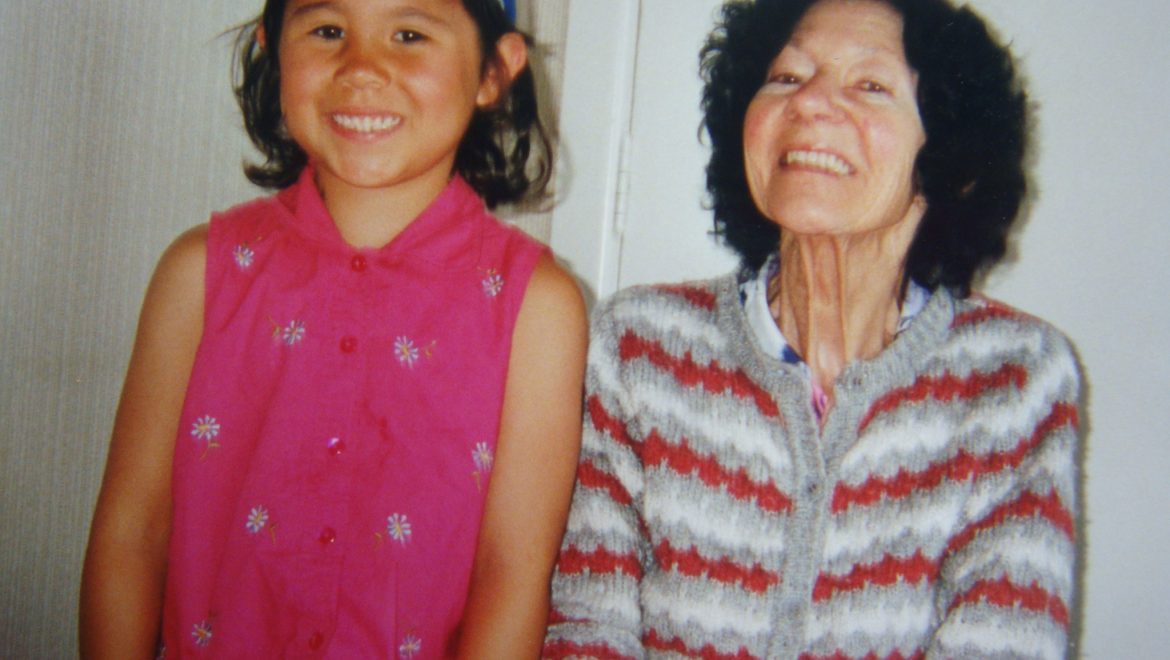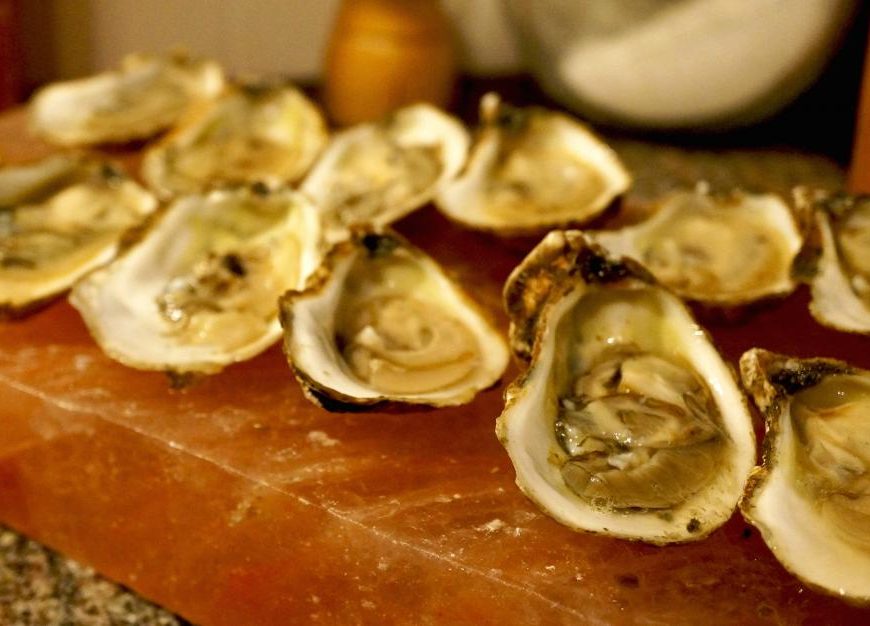We all know someone who is affected by Dementia or Alzheimer’s. Alzheimer’s is the most common form of Dementia, it contributes to 60-70% of cases. It is estimated 5-8% of the population over 60 years old has Dementia. Some call it “type 3 diabetes” because the brain’s cells become insulin resistant and unable to utilise glucose properly.
My Grandma Betty (my Dad’s Mum, half Irish and half English) lived alone for most of her final years. I vividly remember a time when I was 10 years old. I knocked on her door in Rotorua with a packet of biscuits. She opened her door and was pleased to see a young girl selling biscuits. “Hello dear I’ll buy some, how much?” she said. “I’m not selling them, I’m your granddaughter” I replied. “Oh are you dear?! Come in!” We sat there awkwardly munching through a packet of biscuits and drinking stale tea, surrounded by cat pictures, cat ornaments, and all of the stray cats in the neighbourhood. We couldn’t have a conversation because she had lost all of her marbles a while ago. When the family finally realised she had got to this stage they moved her into a home in Auckland. My dad started visiting her daily and I visited weekly. He was the only person she knew in this world. Not even once a week was enough to remember my name. She recognised my face and could make the connection I look like my Dad so I must be his daughter which makes me her Grandchild. But I might as well have been a stranger. How is this quality of life? Dare I say I would rather not be alive than in that state, to be remembered like that. There is a long list of reasons why I became a Naturopath. This is one of them. To know as much as I can about preventing degenerative diseases in me and my loved ones. Grandma Betty (Elisabeth) passed away when I was 15. I wish I had all of this knowledge I have now, back then.
Brain Boosters
Coffee is of course the most overused and well known brain-booster. Because it works! It increases energy, mood, learning, reaction time, memory, metabolic rate, physical performance, and it is a source of antioxidants. It is also associated with a decreased risk of type 2 diabetes and liver disease. But I am not trying to sell you coffee! If coffee benefits you then do keep drinking it if you enjoy it. However, it does not serve everyone. I personally can’t drink coffee. One time I had a mocha at 9am. My heart raced the rest of the day, I felt on edge and anxious, and I didn’t sleep at all that night. For people who are already stressed or anxious, caffeine adds to this and can make it worse. Not to mention insomnia, dehydration (as coffee is a diuretic), stained teeth, and hindered absorption of the important minerals calcium, magnesium, iron and zinc.

Alternatives to Coffee
Lion’s Mane is a super brain-booster. Don’t be alarmed, lion’s mane is not actually the mane of a lion! Lion’s Mane is a medicinal mushroom, and the one to choose for everything memory or concentration related. Other medicinal mushrooms include shiitake, chaga, reishi, cordyceps, maitake, and turkey tail (again not actually a turkey’s tail!). They all have unique benefits. Traditional Chinese Medicine (TCM) practitioners have known the healing powers of medicinal mushrooms for thousands of years. But Western natural health practitioners have just woken up to the idea. Lion’s Mane contains compounds that stimulate the growth of brain cells. It has been shown to reduce memory loss and neural damage caused by amyloid-beta plaques which accumulate in the brain in Alzheimer’s. Perfect for anyone who has brain fog and desires sharper mental clarity. Lion’s Mane is available in its fresh mushroom form in good health stores, or more commonly as a dried powder. The powder can be added into smoothies – the earthy flavour goes nicely in chocolate flavoured smoothies or protein shakes. Hot chocolate and coffee substitute beverage mixes are available including Lion’s Mane in them. You can also get Medicinal Mushroom blends, that way you are getting benefits of all of them including Lion’s Mane. Start with 1/4 teaspoon and then 1/2 teaspoon, working your way up to 1 teaspoon. Check out my Choc Mint Bliss Balls with Medicinal Mushrooms.
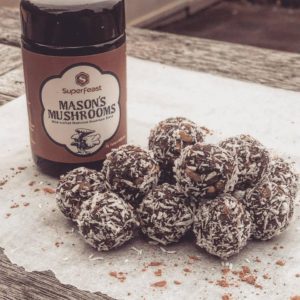
Coconut oil is full of medium-chain triglycerides (MCTs). The two main foods rich in MCTs are coconut and palm. As you have probably heard, palm should be avoided for the livelihood of orangutans. Coconut is the best option. Fats found in other foods are long-chain triglycerides. Whereas, short-chain triglycerides are produced by our good bacteria (probiotics) in our gut when we eat fibre (prebiotics). MCTs are broken down into ketones and used by our brain as fuel. The brain actually thrives off ketones. Coconut oil is used therapeutically in epileptic children. A Keto diet also works but at least coconut oil allows them to eat a few carbs in their diet. In Alzheimer’s there is a reduced ability to use glucose for energy in certain parts of the brain – normally glucose is our primary brain fuel. Ketones provide an alternative energy source for these malfunctioning brain cells. Coconut oil is a superfood and has many more benefits beyond brain health. Coconut oil can be used in place of most other oils. The difference is that it has a slightly sweet taste and it is solid at room temperature. Some people don’t like using coconut oil in savoury recipes, but it is perfect for sweet things including smoothies, baking and sweet treats. The dose of coconut oil used in Epilepsy and Alzheimer’s is 4 tablespoons per day, up to this level is safe. MCT oil can be taken instead of coconut oil, it is more potent. MCT oil is tasteless and more processed, however, it is more effective. It is 100% MCTs while coconut oil is 45-65% MCTs. Heard of bulletproof coffee?! MCT oil is one of the brain-boosting components of this popular pick-me-up. For the average person I would recommend coconut oil and for people with Dementia, Alzheimer’s or Epilepsy, MCT oil is the superior option.
Omega 3. Our brain is nearly 60% fat, and of that fat content 25% is omega 3 and 90% of the omega 3 is DHA (one component of omega 3 – the other is EPA). That is why it is so important for pregnant women to take DHA or omega 3 for the development of a little brain inside them. There is a connection between increased fish and fish oil intake in pregnancy, and higher IQ scores in their children in early childhood. In older adults lower blood levels of DHA are associated with smaller brain size and signs of accelerated brain aging. DHA and EPA are found in salmon, sardines, anchovies, mackerel, other seafood (oily fish are best), or fish oil, krill oil or cod liver oil supplements. Plant sources are chia seeds, flaxseeds/linseeds, hempseeds, walnuts, pecans, and their oils. Plant sources are inferior to animal sources because the omega 3 they contain is called Alpha Linolenic Acid (ALA) which needs to be converted into its active forms (DHA and EPA) in the body. It is estimated that only 10% of ALA is converted into DHA and EPA in the body. Dementia and Alzheimer’s involves brain inflammation. An anti-inflammatory diet is the first step in reducing inflammation. This includes omega 3 plus whole, unprocessed foods especially olive oil, similar to a Mediterranean diet. Include plenty of antioxidants. An anti-inflammatory diet avoids white flour, refined sugar, processed meat and too much red meat, and trans fats and vegetable oils – full of omega 6 inflammatory fats. If your intention is to boost your concentration and memory, supplements are required in addition to diet – unless you eat oily fish every day. Aim to eat fish at least twice a week plus take a high quality fish oil supplement.
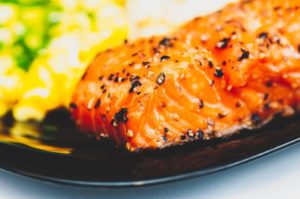
Cacao contains theobromine – a less-stimulating stimulant than caffeine. Cacao also has polyphenols (an antioxidant) which help to reduce neurodegenerative diseases by improving blood flow to the brain, and therefore, brain function. The brain relies on nutrients carried by blood. Cacao has been shown to improve memory, reaction time, and reduce Alzheimer’s. Cacao is the less processed form of cocoa. Cacao is made by cold-pressing unroasted cocoa beans. The fat is removed, this is cacao butter – used in some sweet treats. Cocoa is roasted at a high temperature, this loses some of the antioxidants. Whereas cacao is raw so you get more bang for your buck. Commercial chocolate bars are made with cocoa so they don’t count! Cacao can be used to make chocolate protein shakes/smoothies, homemade raw chocolate, desserts and an array of sweet treats. Consume up to 1 tablespoon of cacao powder per day.

Blueberries – see it’s not all crazy, unusual foods. Blueberries are a rich source of anthocyanins, an antioxidant found in blue and purple fruits like blackcurrants, blackberries, eggplant skin, red cabbage, cranberries and cherries. Blueberries are believed to increase memory by increasing the birth rate of brain cells in the hippocampus (long term memory centre). The brain is vulnerable to oxidative stress due to its high oxygen consumption. One theory is that in Alzheimer’s, the brain has less ability to oxidative stress. The main way to counteract stress is to eat more antioxidants found in a rainbow of fruit, veggies, herbs and spices. Levels of antioxidants in foods are measured on the ORAC scale (oxygen radical absorbance capacity) – this can be found online. Spices top the list but the problem is we only eat them in small quantities, we can’t sit down to a plate of spices for dinner! It is still valuable to include them in your meals when you can e.g. cloves, sumac, cinnamon, oregano, turmeric, cumin, parsley, basil, and curry powder. The main ones after that are acai berry powder/pulp and cacao powder. Cacao is superior to cocoa but both are good sources of antioxidants. Eat 1/2 to 1 cup of blueberries every day, fresh or frozen. Frozen is more economical and just as nutritious – especially in smoothies, don’t waste your fresh berries in smoothies.
The popular Ketogenic diet is not only for rapid fat loss. It was originally developed in 1920s as an alternative to fasting, as therapy for children with difficult-to-treat (now called drug-resistant) epilepsy. Nowadays medications are successful for many sufferers, however, still fail to treat 20-30% of cases. It is these individuals who can benefit from Keto. The brain is fuelled by ketones (like consuming coconut oil) because sugar from carbs is in short supply. This also allows our blood sugar to be balanced, reducing the blood sugar roller-coaster causing mood swings and to become HANGRY. When you eat a high carb diet you get to the point where you have to eat because your blood sugar is so low. On a low carb diet you are more in control of your mood and can skip a meal without noticing too much difference in yourself. On Keto carbs are limited to 50 grams a day or less. You may be surprised but protein is also restricted because too much protein can also inhibit ketosis. Ketones may protect brain cells by reducing oxidation which causes inflammation, contributing to Alzheimer’s. More substantially, research shows that older adults at risk of Alzheimer’s have shown an improvement in memory after a low carb diet for 6 weeks. If this level of carbs is difficult to achieve, coconut oil can be added to your diet as an exogenous (external) source of ketones rather than relying on your body to produce them all from a low carb diet.
Liv’s Brain & Heart Tonic is a specialised formula, designed to optimise brain function and blood circulation around the body. Ginkgo has cognitive enhancing and neuroprotective properties. It is commonly recommended for adults for preventing Dementia, assisting brain function, and increasing blood circulation, especially after a stroke. Hawthorn is known to reduce blood pressure and protect the heart. Bacopa is also cognitive enhancing, shown in research to improve mental performance and memory. Check out Brain & Heart Tonic here.
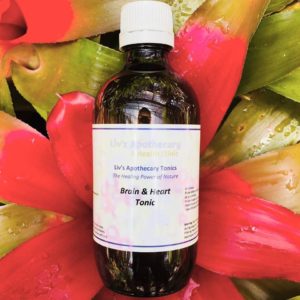
Additional ways to help prevent Dementia include regular exercise, not smoking, avoiding heavy drinking, managing weight, eating a healthy diet, and maintaining healthy blood pressure, cholesterol and blood sugar levels. Other risk factors include depression, low level of education, social isolation, and cognitive inactivity. Keep up those crosswords and sudokus! There also may be an association between Alzheimer’s and aluminium. Research found people who use deodorant and antacids (acid reflux medication) containing aluminium had a higher risk of developing Alzheimer’s. I recommend aluminium-free deodorant.
Brain Boosting Smoothie. On days I need to use my brain for writing or if I am feeling a little unenergetic, I make a Brain Boosting Smoothie for breakfast. It is the perfect caffeine-free start to my day! I use 1 frozen banana, ½ cup frozen blueberries, 1 serve of coffee (or chocolate) flavoured protein powder, 1 serve of mocha (or plain) flavoured collagen, 1 teaspoon ground flaxseed, 1 tablespoon almond butter, ½ teaspoon Lion’s Mane, 1 teaspoon coconut oil, and enough coconut milk to blend. Add 1 teaspoon of cacao powder if you like a dark, rich smoothie. Take fish oil and a swig of Brain & Heart Tonic alongside if you need too!
This will get you buzzing! Perfect for studying students on exam day or anyone who finds themselves brain dead after a day at work.


